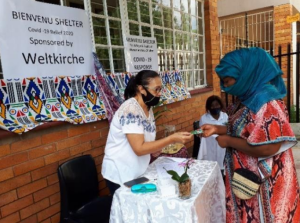
Southern Africa: Response of the Catholic Church to the Covid-19 Pandemic

The Southern African Catholic Bishops’ Conference (SACBC), within the Department of Social Action, organized a committee to collect the reports of Covid-19 responses from all of the organizations and dioceses that contributed towards the relief of the thousands of poor, needy, vulnerable and desperate men, women and children as a result of the effects of the pandemic. While addressing the responses given by the Church to the needs of all the vulnerable sectors of the population, special attention is offered to the different categories of people on the move.
This was so because while “most South African nationals were able to access food parcels and social grants from the South African government, however it was agreed that migrants, refugees, asylum seekers and undocumented people were the most vulnerable and disadvantaged by the current situation.” A similar situation occurred in the other countries of the Conference, Botswana and eSwatini.
Bishop Sithembele Sipuka, SACBC President and Bishop of the diocese of Mthatha, stated in the Introduction: “The Church responded immediately. Every diocese, parish, religious congregation, and social outreach surveyed their communities, identified those most affected, and provided them with nutrition, medication and counselling. Many, especially migrants and refugees who did not qualify for South African government food parcels or social grants, might not have survived if it wasn’t for the support they received from the Church. This book documents in detail the response of the Church.”
His Eminence Cardinal Wilfrid Napier OFM, President of Caritas South Africa, added: “We are proud to report in South Africa that our national body, Caritas South Africa, began immediately to be actively engaged in relief works, especially among migrants, refugees and undocumented people of all kinds. Much sterling work has been done in very difficult conditions of the hard lockdown, during which we were permitted to leave home only to buy essential foodstuffs, to seek medical attention, to obtain fuel and to access the bank.
 Subsequent to that initial lockdown, restrictions have been enforced to address the need. One thing is sure: the lockdown has caused unimaginable hardships everywhere, but particularly in the poorest communities. To mitigate the effects of COVID-19, the President announced a ZAR 800 billion (Euro 40 billion) relief and rescue package. This included the distribution of food parcels to the country’s poorest households, as well as a monthly welfare grant of R350.00 per month. Unfortunately, these benefits were only available to the documented South African citizens, permanent residents and documented refugees, despite the fact that the country is home to more than five million foreign nationals, over a million of them refugees, asylum seekers, and undocumented people – who are the most vulnerable and indigent.”
Subsequent to that initial lockdown, restrictions have been enforced to address the need. One thing is sure: the lockdown has caused unimaginable hardships everywhere, but particularly in the poorest communities. To mitigate the effects of COVID-19, the President announced a ZAR 800 billion (Euro 40 billion) relief and rescue package. This included the distribution of food parcels to the country’s poorest households, as well as a monthly welfare grant of R350.00 per month. Unfortunately, these benefits were only available to the documented South African citizens, permanent residents and documented refugees, despite the fact that the country is home to more than five million foreign nationals, over a million of them refugees, asylum seekers, and undocumented people – who are the most vulnerable and indigent.”
The full Report can be read here.




